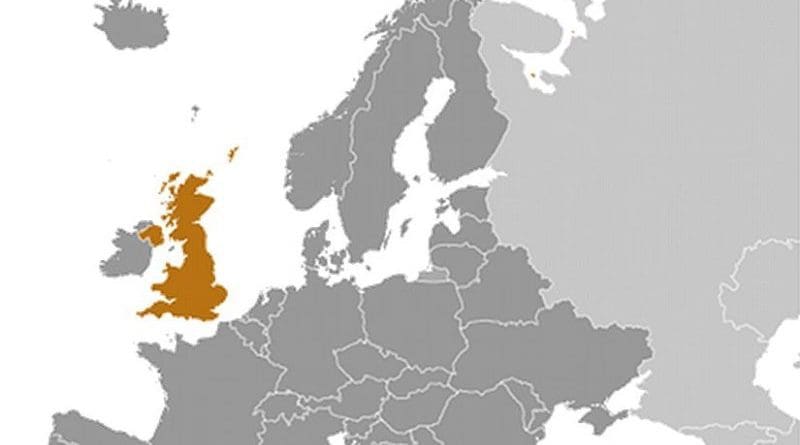Britain Has Little Alternative But To Pack Its Bags, For Now – OpEd
By Arab News
By Trisha de Borchgrave*
Last year, following Britain’s EU referendum result, I wrote that the British “do not have the temperament nor the stomach to claw back some sort of membership of the European Union,” because “the political fight to remain will not match the emotional instinct to leave.”
A year later, growing media coverage about the infinitely complex and largely negative economic impact of Britain’s departure has sown seeds of doubt among some of the electorate who voted to leave. The Telegraph, a pro-Brexit newspaper, recently published the results of a Survation Survey, in which “a clear majority of Britons (54 percent) would vote to Remain in the EU if another referendum was held, while 46 percent would back Brexit.” A similar majority supported stopping the exit talks altogether and working to stay in the EU. Now, the Liberal Democrats’ next leader, Sir Vince Cable, says he is “beginning to think Brexit may never happen.”
However, the June 8 election did not result in a demand to remain in the EU; the Conservatives, with a commitment to Brexit, still won. And Labour leader Jeremy Corbyn only picked up disaffected UK Independence Party (UKIP) voters because of his reluctance to embrace the EU. All the election did was tear off the blindfold imposed by Prime Minister Theresa May’s overworked line, “a bad deal is worse than no deal.”
Having second thoughts is not the same as charting a new course. If Britain chose to shrug its way back into the EU, after a humiliating two-year attempt to negotiate a deal that salvaged its economy and future prospects, its status would be one of atonement. Prodigal but toxic, and simmering with resentment, the next British government would find it difficult to differentiate between being listened to, tolerated, or ignored by its EU counterparts. As a consequence, it would be suspected of blocking tactics at every EU legislative level of decision-making.
In addition holding a second referendum on the negotiated deal before the final “adieu” in March 2019 would pollute British politics for years to come. Some argue that this is already the case, but challenging the June 2016 result would give credence and hope of revival to an otherwise fading UKIP, while leaving British politics forever divided and potentially ungovernable.
And, despite recent comments to the contrary, European leaders do not really wish this upon themselves. There is no love lost today with the UK, and European member states are moving on, dismissively and pragmatically, and with a tad of Macron-inspired muscle flexing.
Short of a catastrophic recession in the next 18 months or a World War III in which Britain puts aside its Brexit agenda to stand in solidarity with Europe, it is no longer whether Britain leaves, but how.
There is a logical answer. Keeping tariff-free access to the EU trading bloc within the realistic constraints of a five- to 10-year transitional framework after the departure date of March 2019 is the only way to slow the pain. It will take at least this long for the UK to put in place the customs, certification procedures and resources to trade functionally and legally. And the compromise that binds it to EU rules under the jurisdiction of the European Court of Justice will curtail any potential tensions with Northern Ireland and its TBD future status while bringing down the exit bill.
During this transition period the EU itself may evolve fundamentally, especially on movement of labor. President Emmanuel Macron is backing the notion of “posted workers” primarily from Eastern European member states, who would be restricted by “agency contracts” from their home nations. This may help ease the difficult negotiations over future citizens’ rights.
But logic may not prevail. The high turnout of voters who denied the Conservatives their expected majority on June 8, and endorsed Jeremy Corbyn as a potential prime minister, has shone a critical light on the fragility of the Conservative mandate, and indeed of the party’s ability to carry out the exit process when it is crippled by internecine warfare.
Without a trusted coalition for a Plan A for Brexit, with little sense of the UK’s priorities and what it is prepared to lose or win, and seemingly without awareness of the real threats to the country’s economic wellbeing, Britain is running out of options in or out of the EU. A Plan B of sorts has materialized; a collapse of the negotiations so that Theresa May, or whoever wants to jump into the snake pit leadership of a minority government, can blame Labour and hope to win the next election.
When those respecting the “will of the people” are faced with the reality of leaving, it is hard and unbearably sad. It still tastes of betrayal, and the government’s first efforts at disentangling itself from Europe feel like the cutting of an umbilical cord. The tabling of its “Repeal Bill” that will transfer EU legislation into British jurisdiction, is no longer known as “Great”. It has been met with open hostility by Labour, the Liberal Democrats, Scotland and Wales.
Many have turned into reluctant lemmings on that cliff edge, shouting for others to stop pushing from the back. They know they are wedged in a no man’s land where there is no good outcome to staying or leaving.
*Trisha de Borchgrave is a writer and artist based in London. She can be reached at www.trishadeborchgrave.com and through Twitter @TrishdeB

